Photo: Cindy Ord/Getty Images
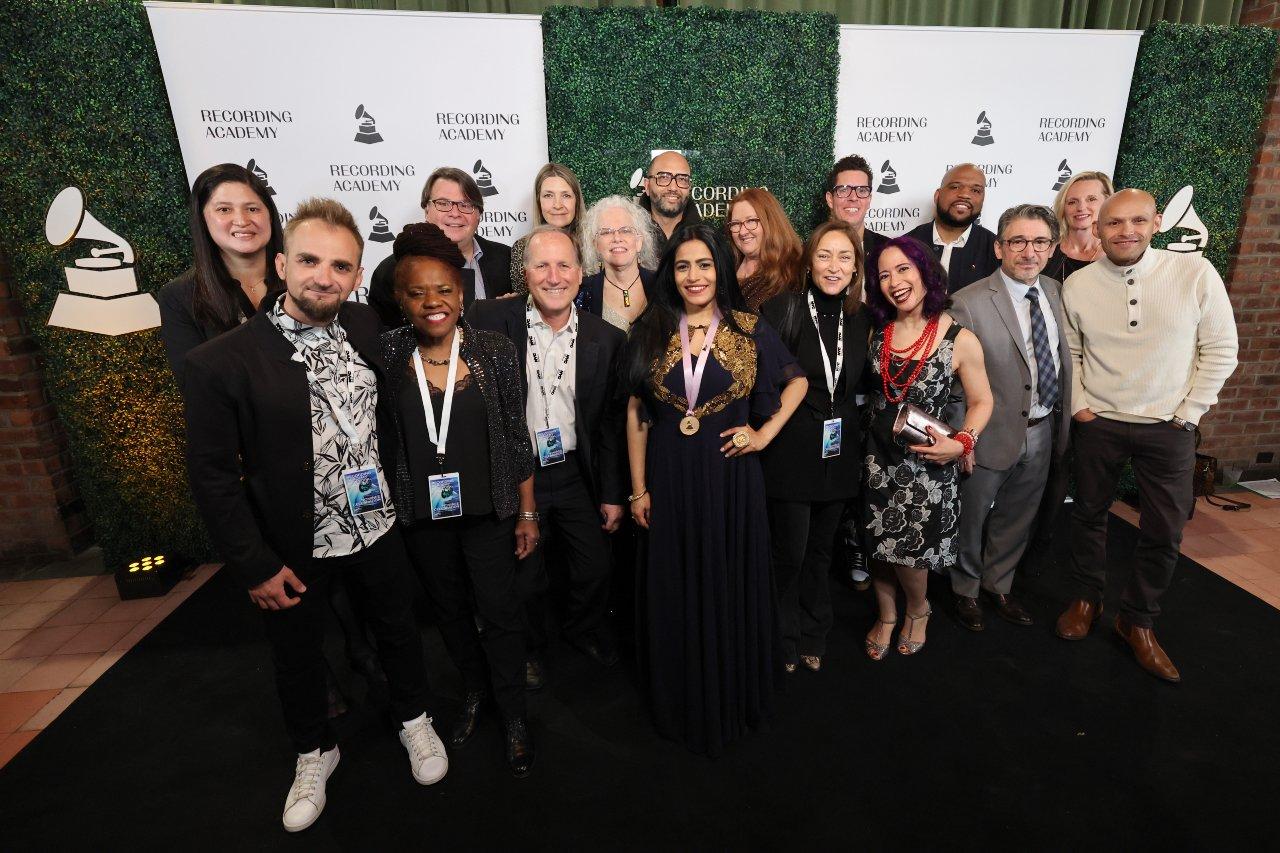
news
Here's What Happened At The Recording Academy New York Chapter's 2022 GRAMMYs Nominee Celebration: Good Jitters, Good Company & A Spotlight On All Categories
Ahead of the 2022 GRAMMYs, the Recording Academy’s New York Chapter convened for a celebration of the Chapter’s members, current nominees, and the wider New York musical omniverse — which is about to be elevated to the global stage once again
It's a four-hour drive from Los Angeles to Las Vegas — but to get from from JFK to LAS, you're looking at five or six hours in the air. Factor in hotels, transportation, credentials, innumerable other logistics — and the still-existent pandemic — and the New York Chapter of the Recording Academy's Nominee Celebration in Manhattan on Mar. 28 was the site of many palpable jitters.
But they were good jitters. As GRAMMY nominees and industry professionals sipped cocktails from an open bar at the Bowery Hotel, settled into comfortable fireside couches and overall enjoyed each other's company, a glimpse into the upcoming magic of the 64th GRAMMY Awards revealed itself. Sure, many of the folks involved were nominated for the same golden gramophone, but there was nary a competitive vibe to be found. Instead, the overarching feeling in the room was of gratitude — that NYC's musical community would be elevated as a united entity.
A more specific pleasure to be found at the celebration, though, was the highlighting of categories more centric to the Premiere Ceremony than the main show. Sure, the lion's share of the attention is generally bestowed on categories like Best New Artist and Album Of The Year But what of Best Instrumental Composition, Best Children's Music Album and Best Latin Jazz Album? Simply put, they matter, too — immensely so.
So it was rewarding to catch up with GRAMMY-nominated artists like family-music singer/songwriter Falu, jazz pianist and composer Luis Perdomo, and harpist and composer Brandee Younger about the inspirations behind their GRAMMY-nominated works and their feelings as the 2022 GRAMMY Awards — and, yes, the crush of flights from JFK, LaGuardia and Newark — draw near.
Read More: 2022 GRAMMYs Awards Show: Complete Nominations List
Among the flashing camera bulbs and piped-in club beats, singer/songwriter Falu — who has been nominated for Best Children's Album for 2021's A Colorful World — calmly reinforced the importance of making substantive music for families to enjoy together.
"Children are the future, and the seeds that we sow in them right now really blossom and make them better citizens," the two-time GRAMMY nominee told GRAMMY.com on the red carpet, stressing that family music should "teach them the values of inclusiveness, diversity, uniqueness and embracing each other, rather than being scared of each other's differences."
And if this means that the music might introduce challenging concepts that don't just pacify with pretty sounds and colors, remember: children are wiser, and more absorbent, than we often give them credit for. "The messages aren't so complex that you can't make a 5-year-old understand," she added. "It becomes natural — something they do when they're sleeping, having dinner, or just playing in the park."
The concept of naturalness came up over and over in these conversations, driving home the point that these GRAMMY-nominated offerings were pure, human expressions — not mere vyings for global recognition. As for the revered pianist Luis Perdomo, his collaborative album with saxophonist Miguel Zenón, El Arte Del Bolero, wasn't even supposed to be a record in the first place.
"We just did it as something for fun," he explained to GRAMMY.com of the dreamy, luminous record. "Kind of like after the gig's over, the club is closing and a lot of people leave, and there are only a few people left — that was the vibe of that." With only a phone call and zero rehearsal, the Venezuelan pianist and Puerto Rican tenorman plumbed the Latin American songbook, dreamily performing standards like "Como Fue," "La Vida Es Un Sueño" and "Jaguete" during a COVID-era livestream at an empty Jazz Gallery in Manhattan.
El Arte Del Bolero resonated far beyond its low-key concept and presentation — the pair now have a GRAMMY and Latin GRAMMY nomination to show for it. "We did it just to put it out on YouTube," the twice-nominated Perdomo said. "It was a wild surprise." No matter what happens during the 2022 GRAMMY Awards, this nomination shows that two old friends performing songs they've known all their lives can still move listeners on a global scale.
In that same spirit, Brandee Younger — who's nominated for Best Instrumental Composition for "Beautiful is Black" — considers how her musical family in New York has been uplifted by the 2022 GRAMMY Awards nominations. “I feel like some underdogs came up,” Younger told GRAMMY.com over text a few days after the party, shouting out fellow GRAMMY nominees Curtis Stewart, Jon Batiste, the Baylor Project, Jazzmeia Horn and Kanye West — she played on the latter’s colossal, complicated, Album Of The Year-nominated Donda.
And if you want to find out how up it can get, tune into the 2022 GRAMMY Awards on April 3 to watch these creative dynamos show the world what New York's musical omniverse is all about.
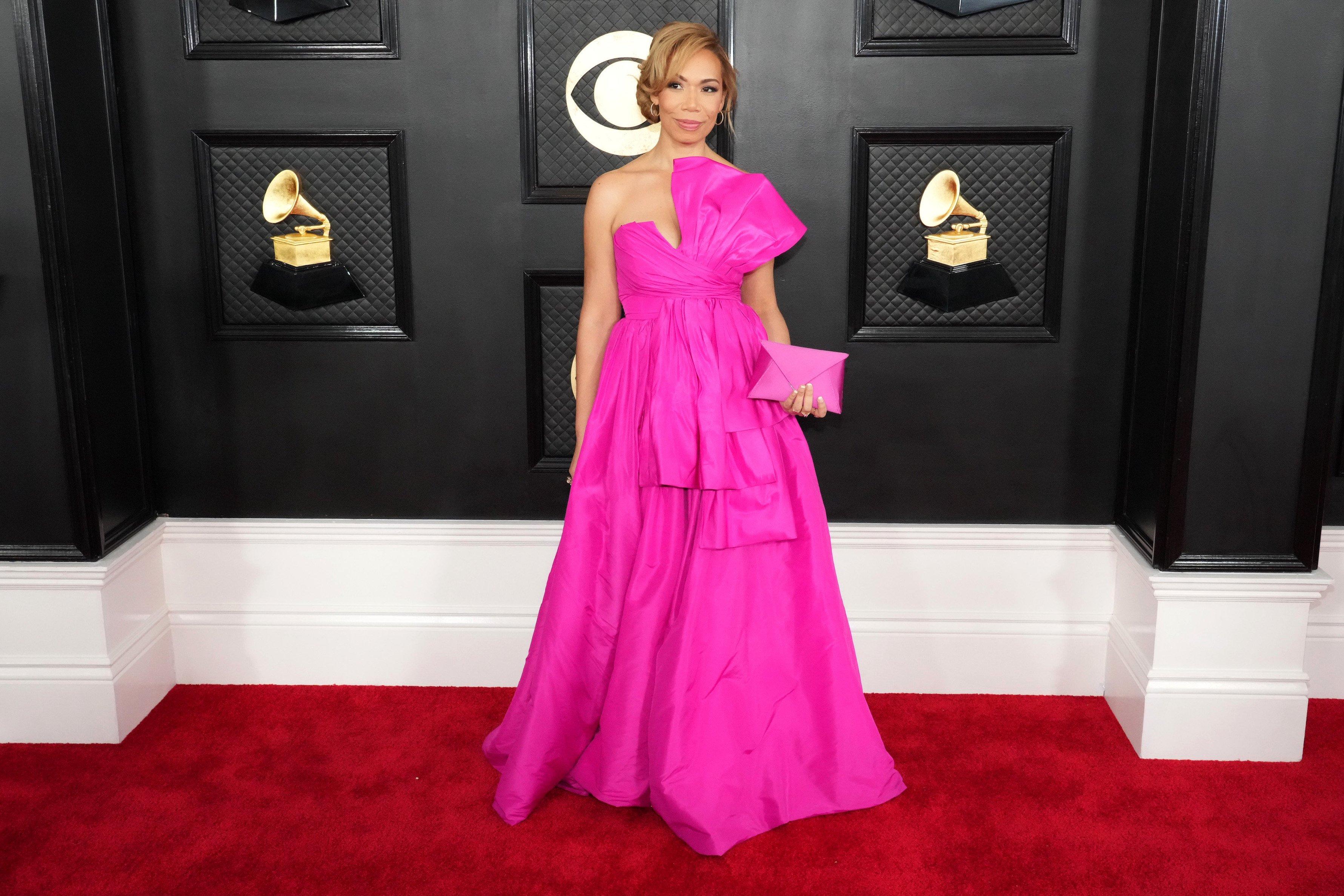
Photo: Jeff Kravitz/FilmMagic
video
Where Do You Keep Your GRAMMY?: Autumn Rowe Revisits Her Unexpected Album Of The Year Win With Jon Batiste
Acclaimed songwriter Autumn Rowe reveals the inspirational location where her Album Of The Year golden gramophone resides, and details the "really funny way" she first met Jon Batiste.
Ever since Autumn Rowe won a GRAMMY in 2022, it's been her biggest motivation. That's why the musical multi-hyphenate keeps the award nestled in her writing room — to keep her creative juices flowing.
"It reminds me that anything is possible," she says in the latest episode of Where Do You Keep Your GRAMMY?
Rowe won her first-ever career GRAMMY in 2022 with an Album Of The Year award for Jon Batiste's We Are. "It was very stressful," she recalls with a laugh.
"Right before they announced Album Of The Year, the pressure started getting to me," Rowe explains. "Album Of The Year is the biggest possible award you can win. So, I'm like, 'We didn't win any of these [categories], how are we going to win the biggest award?"
The win also taught her one unforgettable, valuable lesson: "We matter. The music matters. Everything matters. We just have to create it. If there isn't space for it, we have to make space for it. Don't wait for something to open."
Rowe says she grew up "super dirt poor" and never even had the opportunity to watch the awards ceremony on television. "To be a GRAMMY winner means it is possible for everyone," she declares.
Press play on the video above to learn more about the backstory of Autumn Rowe's Album Of The Year award, and remember to check back to GRAMMY.com for more new episodes of Where Do You Keep Your GRAMMY?
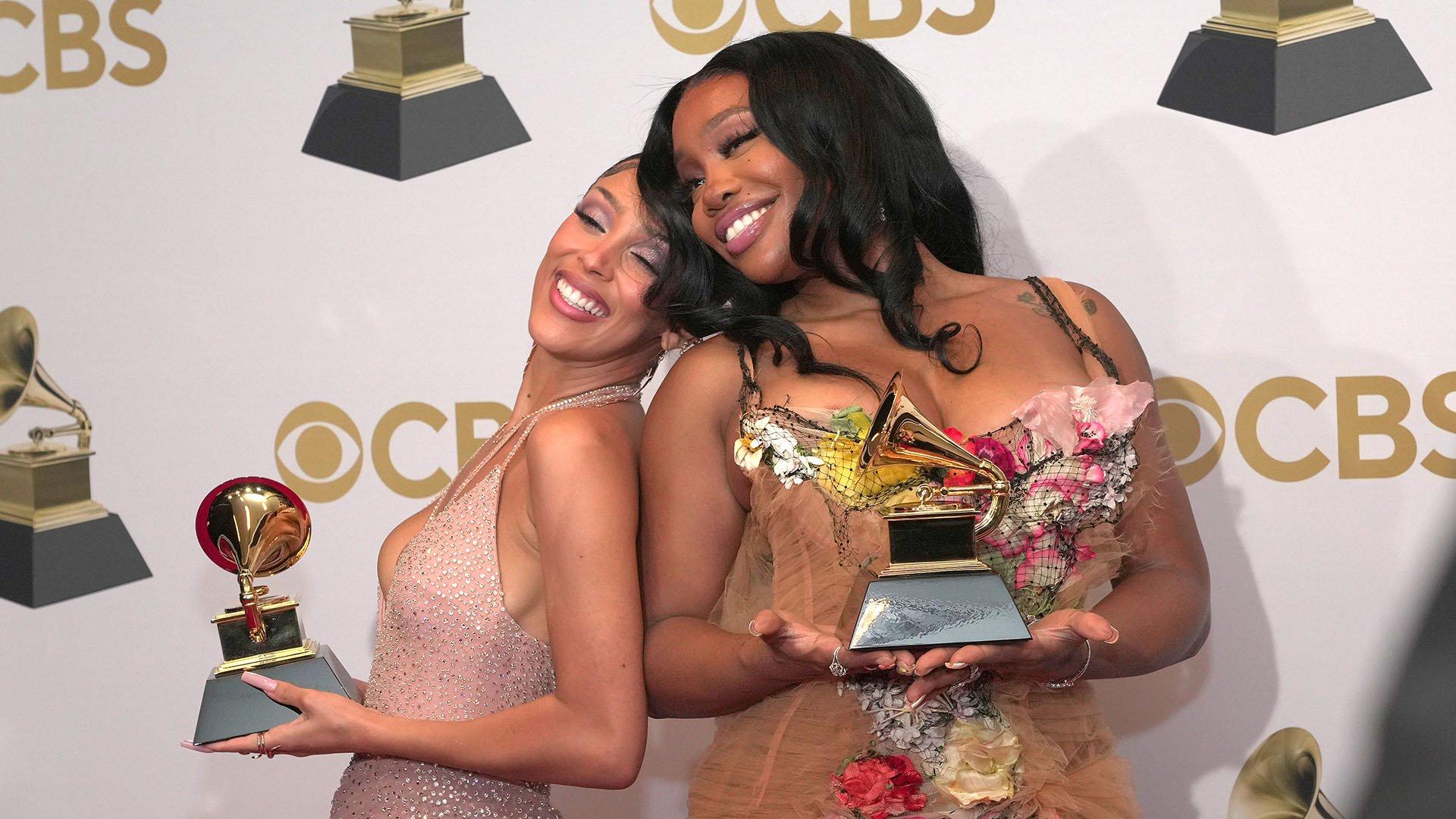
Photo: Kevin Mazur/Getty Images for The Recording Academy
video
GRAMMY Rewind: Watch Doja Cat & SZA Tearfully Accept Their First GRAMMYs For "Kiss Me More"
Relive the moment the pair's hit "Kiss Me More" took home Best Pop Duo/Group Performance, which marked the first GRAMMY win of their careers.
As Doja Cat put it herself, the 2022 GRAMMYs were a "big deal" for her and SZA.
Doja Cat walked in with eight nominations, while SZA entered the ceremony with five. Three of those respective nods were for their 2021 smash "Kiss Me More," which ultimately helped the superstars win their first GRAMMYs.
In this episode of GRAMMY Rewind, revisit the night SZA and Doja Cat accepted the golden gramophone for Best Pop Duo/Group Performance — a milestone moment that Doja Cat almost missed.
"Listen. I have never taken such a fast piss in my whole life," Doja Cat quipped after beelining to the stage. "Thank you to everybody — my family, my team. I wouldn't be here without you, and I wouldn't be here without my fans."
Before passing the mic to SZA, Doja also gave a message of appreciation to the "Kill Bill" singer: "You are everything to me. You are incredible. You are the epitome of talent. You're a lyricist. You're everything."
SZA began listing her praises for her mother, God, her supporters, and, of course, Doja Cat. "I love you! Thank you, Doja. I'm glad you made it back in time!" she teased.
"I like to downplay a lot of s— but this is a big deal," Doja tearfully concluded. "Thank you, everybody."
Press play on the video above to hear Doja Cat and SZA's complete acceptance speech for Best Pop Duo/Group Performance at the 2022 GRAMMY Awards, and check back to GRAMMY.com for more new episodes of GRAMMY Rewind.
How 'SOS' Transformed SZA Into A Superstar & Solidified Her As The Vulnerability Queen
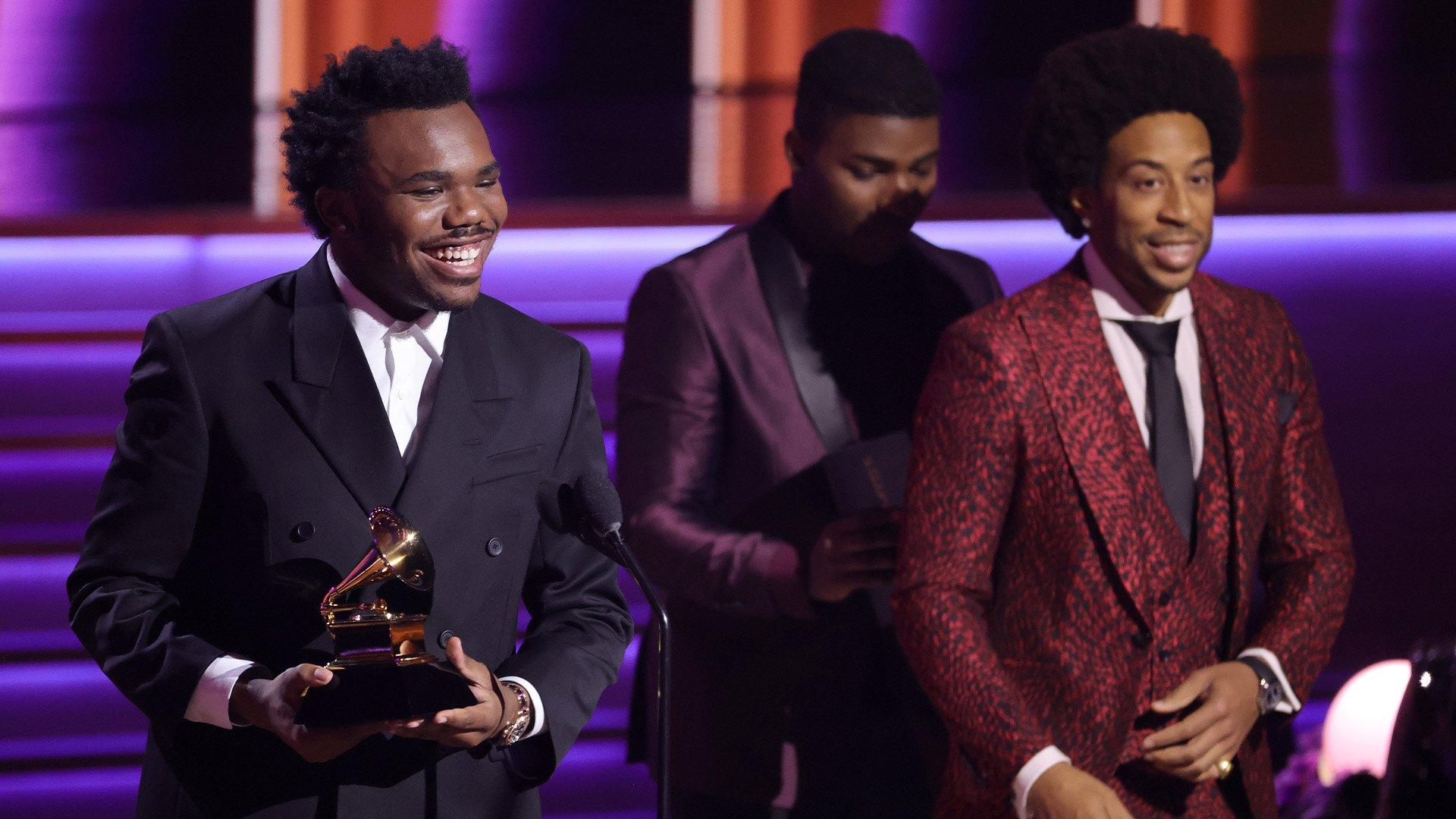
Photo: Matt Winkelmeyer/Getty Images
video
GRAMMY Rewind: Watch Baby Keem Celebrate "Family Ties" During Best Rap Performance Win In 2022
Revisit the moment budding rapper Baby Keem won his first-ever gramophone for Best Rap Performance at the 2022 GRAMMY Awards for his Kendrick Lamar collab "Family Ties."
For Baby Keem and Kendrick Lamar, The Melodic Blue was a family affair. The two cousins collaborated on three tracks from Keem's 2021 debut LP, "Range Brothers," "Vent," and "Family Ties." And in 2022, the latter helped the pair celebrate a GRAMMY victory.
In this episode of GRAMMY Rewind, turn the clock back to the night Baby Keem accepted Best Rap Performance for "Family Ties," marking the first GRAMMY win of his career.
"Wow, nothing could prepare me for this moment," Baby Keem said at the start of his speech.
He began listing praise for his "supporting system," including his family and "the women that raised me and shaped me to become the man I am."
Before heading off the stage, he acknowledged his team, who "helped shape everything we have going on behind the scenes," including Lamar. "Thank you everybody. This is a dream."
Baby Keem received four nominations in total at the 2022 GRAMMYs. He was also up for Best New Artist, Best Rap Song, and Album Of The Year as a featured artist on Kanye West's Donda.
Press play on the video above to watch Baby Keem's complete acceptance speech for Best Rap Performance at the 2022 GRAMMYs, and check back to GRAMMY.com for more new episodes of GRAMMY Rewind.
How The 2024 GRAMMYs Saw The Return Of Music Heroes & Birthed New Icons
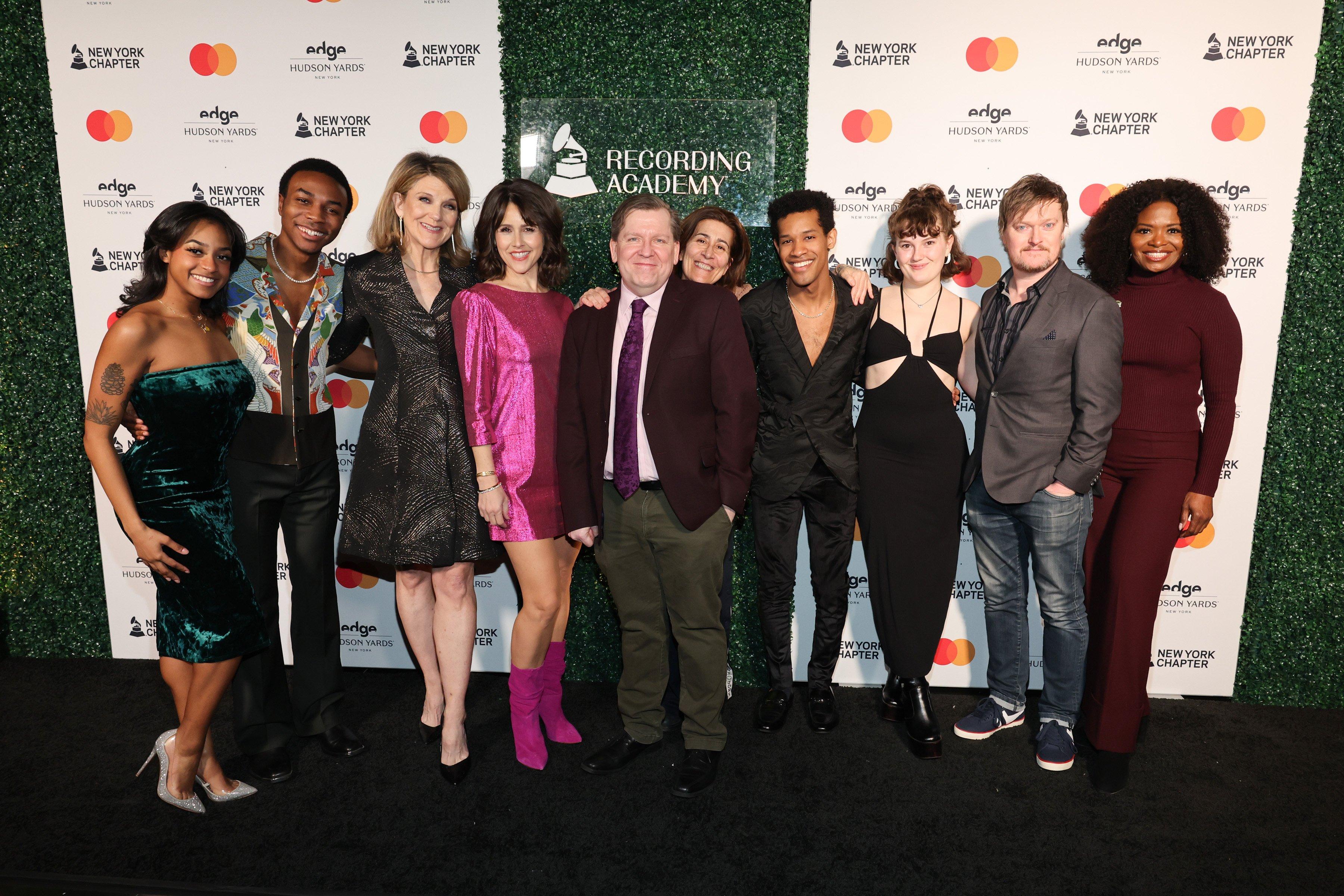
Photo: Cindy Ord for Getty Images
feature
The Recording Academy's 2024 New York Chapter Nominee Celebration: Crackling Music & Company Ahead Of The 2024 GRAMMYs
On the evening of Jan. 22, GRAMMY nominees and associated talent flooded the Edge at Hudson Yards in Midtown Manhattan for drinks and good company, ahead of the 2024 GRAMMYs on Feb. 4.
From the 101st floor of a Hudson Yards skyscraper, Nick Cucci, the Recording Academy's Senior Executive Director of the New York Chapter, made a proclamation. Sure, their Chapter Nominee Celebration happens every year, ahead of Music's Biggest Night. But at least one thing differentiated this edition of the annual party:
"This is the highest nominee celebration that's ever existed," he said.
Which, of course, was a reference to the panoramic view at Edge at Hudson Yards, the highest outdoor sky deck in the Western Hemisphere and the event's Presenting Partner. But at the 2024 Chapter Nominee Celebration, the caliber of talent, and company was also incredibly lofty.
As cocktail-attired guests made their way to the skydeck, they were faced with some of music's best and brightest — either nominated at the 2024 GRAMMYs, in past ceremonies, or at the Latin GRAMMYs. Some attendees were simply present to cheer on those up for golden gramophones on Feb. 4.
*The skydeck at Edge at Hudson Yards. Photo: Johnny Nunez via Getty Images*
GRAMMY.com's first step-and-repeat encounter was with jazz pianist, composer, and producer Alex Brown, who's currently up for a GRAMMY for Passion for Bach and Coltrane, a collaborative album with Imani Winds, the Harlem Quartet, poet A.B. Spellman, and more.
"I think it's a cool category that we're part of," Brown tells GRAMMY.com of the Best Classical Compendium Category. He goes on to highlight the Academy's inclusion of disparate sounds and fusions throughout the 2024 GRAMMYs nominations — and every year's.
"The piece that we played is an interesting mix of poetry and classical music and jazz; it's a really interesting combination," Brown says. "I think it's great that the Academy has a category that recognizes that kind of project."
That said, the Academy has a long road ahead, as always; its pursuit of inclusivity in all its forms never sleeps. "I think across the board, we want to see more of everything," says Bryan Carter, who's up for a GRAMMY for Best Musical Theater Album for his work on "Some Like It Hot." "I hope there's more education for jazz, and for theater, and different forms of music."
*Jerry Wonda. Photo: Johnny Nunez via Getty Images*
At the 2024 GRAMMYs, GRAMMY-winning vocalist and composer Arooj Aftab is up for Best Alternative Jazz Album for Love in Exile, her 2023 collaborative album with pianist Vijay Iyer and bassist and multi-instrumentalist Shahzad Ismaily.
The new Best Alternative Jazz Album Category represents jazz that makes inroads into other genres, often to the point that jazziness becomes something else. Commensurately ethereal, meditative and dramatic, Love in Exile might appeal to a niche slice of the listening public.
Which is what makes this nomination even sweeter. "I think that what we put out was these long-format, kind of daring, bold scenes of feelings, and the Recording Academy totally got it," Aftab says with a smile. "And I think that's awesome."
Like Aftab, fellow GRAMMY nominee Ben Wendel — a jazz saxophonist of Kneebody fame — is easygoing amid the industry mania that surrounds GRAMMY season. He's up for Best Contemporary Instrumental Album at the 2024 GRAMMYs, for last year's All One.
"Emotionally, I'm good, man," Wendel says. "I feel overwhelmed by events like this, to be honest. So I don't even know what I'm going to feel like at the GRAMMY Awards themselves, but I'm sure it's going to be even more next-level."
Read More: How Ben Wendel's All One — A Locked-Down Sax-And-Bassoon Exploration — Was Nominated For A GRAMMY
Nicole Zuraitis, however, is feeling the heat, so close to the ceremony. The jazz vocalist is nominated for Best Jazz Vocal Album for How Love Begins, produced by bassist extraordinaire Christian McBride.
"I'm generally in a state of either tears or hysteria or laughter," she says. "Right now, it's really peaked."
After the crowd spilled into an adjacent ballroom to indulge in delicious snacks and an open bar, a small handful of Academy heavyweights took to the mic: Cucci, New York Chapter President Torae Carr and Chief Awards & Industry Officer Ruby Marchand.
"All of the years that you put in, all of those sweatless, sleepless nights in the studio or creating or writing or playing or whatever it is that you do," Carr said, "this is to let you know that we see you and we hear you and we feel you.
"And dammit, when we get out to LA," he added, "we're going to turn up and party, yes?" On a more serious note, Carr noted that "The nomination is a win in itself. To be able to do what you love each and every day is a win in itself."
Marchand, a New Yorker born in the Bronx, took the stage for final remarks — and they had poignancy based on her background in the Big Apple. "It's such an exciting moment to look out in this room, because we have over 200 nominees from New York," she stated. "Congratulations, congratulations."
"We're here to honor music; we're here to honor excellence," Marchand added. Obviously, that comes from all over the planet, as the GRAMMY nominations prove every single year.
But everyone knows that the music that flows from New York is something special. And to rub shoulders and break bread with those who've scaled these heights? It's a distinct privilege.
2024 GRAMMY Nominations: See The Full Nominees List
This year's presenting partner was Edge at Hudson Yards, and the platinum event partner was Mastercard. The Annual New York Chapter partners include Concord, Great South Bay Music Group, Sound Royalties, The Orchard, and The Mechanical Licensing Collective. Levain Bakery was the official cookie partner for the New York Nominee Celebration.
